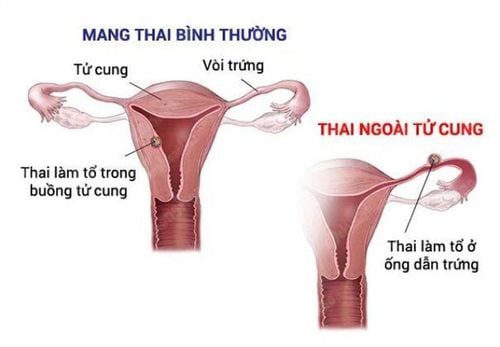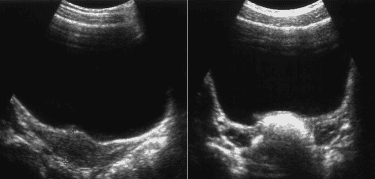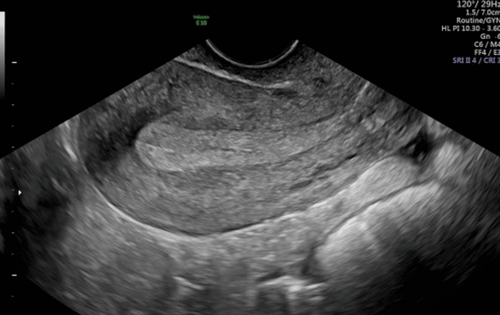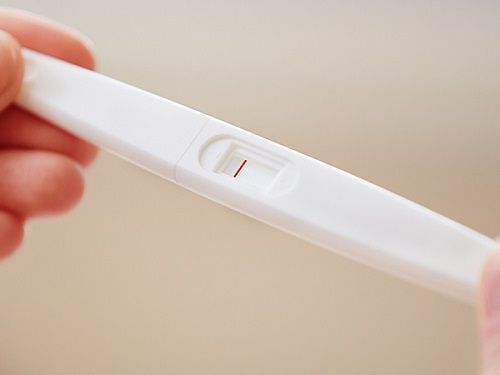This is an automatically translated article.
The article was professionally consulted by Dr. Nguyen Anh Tu - Doctor of Obstetric Ultrasound - Prenatal Diagnosis - Obstetrics Department - Vinmec Hai Phong International General Hospital.Diagnosis of ectopic pregnancy must be based on clinical symptoms and laboratory findings. Ultrasound of ectopic pregnancy is the most widely used modality, with transvaginal ultrasound playing a more important role than transabdominal ultrasound because of its accuracy. The images obtained on ultrasound can directly show the fetus outside the uterus or suggestive images such as sacral and abdominal fluid collection.
1. What is an ectopic pregnancy?
Ectopic pregnancy is a condition in which the fetus implants outside the body of the uterus, the most common abnormal implantation site is the fallopian tube. This is the structure that connects the uterus to the ovaries on either side. When stopping to implant in the fallopian tube, the embryo will not be able to develop into a normal baby and the mother's health will be at risk if the disease is not detected and treated in time.
Other possible implantation sites of ectopic pregnancy are the ovaries, abdomen, and cervix. An ectopic pregnancy is not allowed to persist. Usually, pregnancy termination is done with medication or surgery. The frequency of ectopic pregnancy in the UK is around 1:90 pregnancies and around 11,000 cases a year.

Thai ngoài tử cung cần được khám và điều trị ngay
2. Risk subjects of ectopic pregnancy
Ectopic pregnancy with tubal implantation is the most common type, the main cause of this condition is inflammation of the two fallopian tubes. Besides, hormone imbalance and abnormal development of the fertilized egg also play an important role.
Women with the following characteristics have a higher risk of ectopic pregnancy:
History of diagnosed ectopic pregnancy Inflammation or infection of the fallopian tubes: Sexually transmitted inflammatory conditions Gonorrhea or chlamydia can cause inflammation of the fallopian tubes and nearby organs, increasing the risk of an ectopic pregnancy. Infertility Treatment: Some studies suggest that women who undergo in vitro fertilization (IVF) or other infertility treatments are more likely to have an ectopic pregnancy. Infertility itself increases the rate of ectopic pregnancy. Tubal surgery: Surgery to correct previous tubal abnormalities increases the risk of an ectopic pregnancy. Method of Contraception: The probability of pregnancy when an IUD is inserted is very low, but if contraception fails, the pregnancy is usually an ectopic pregnancy. Tobacco: Smoking before pregnancy is directly proportional to the likelihood of an ectopic pregnancy.

Hút thuốc lá gây nguy cơ thai ngoài tử cung
3. Signs of ectopic pregnancy
Not always ectopic pregnancy has clinical manifestations. In some cases of ectopic pregnancy, the usual symptoms suggestive of pregnancy will appear such as missed period, nausea, and breast tenderness. Patients usually have symptoms around the 4th to 12th week of pregnancy. Many women may only be found to have an ectopic pregnancy during an early ultrasound or when symptoms become more severe later.
Ectopic pregnancy is common in women who miss their period, have a positive pregnancy test, and have signs suggestive of pregnancy. The main clinical symptoms of ectopic pregnancy include: Vaginal bleeding: It is not easy to distinguish abnormal vaginal bleeding from menstrual bleeding. Vaginal bleeding in an ectopic pregnancy is usually a brown, liquid color. Many women mistake it for a normal menstrual cycle and don't realize they're pregnant. Vaginal bleeding during pregnancy is relatively common and is not usually a sign of serious conditions, but still requires evaluation and advice from a doctor. Abdominal pain: Abdominal pain in an ectopic pregnancy usually occurs on one side of the lower abdomen. This symptom can come on suddenly or gradually and last a long time. When an ectopic pregnancy threatens to rupture, blood flows into the abdomen from the fallopian tube, the feeling of abdominal pain will increase much. If the amount of blood increases a lot, the patient may feel shoulder pain because the blood rushes into the pelvis and abdomen, stimulating the nerves that control the sensation of the shoulder. Abdominal pain is a sign of many different diseases, however, you should consult a medical facility if abdominal pain is in a pregnant woman or is suspected to be pregnant. In women of childbearing age, abdominal pain and vaginal bleeding are signs suggesting an ectopic pregnancy to be aware of. Emergency signs: When the ectopic pregnancy attaches to the fallopian tube and causes rupture, the intra-abdominal bleeding becomes massive. Patients who fall into the context of acute blood loss will exhibit many other symptoms such as fatigue, pale skin, severe abdominal pain, and shock.

Chảy máu âm đạo là dấu hiệu nhận biết thai ngoài tử cung
Patients need to seek medical attention immediately if there are signs suggestive of an ectopic pregnancy, including:
Abdominal pain or pelvic pain during pregnancy Abnormal vaginal bleeding Fatigue, Lethargy Other suspicious symptoms, especially when the patient has multiple risk factors for ectopic pregnancy.
4. Can ultrasound detect an ectopic pregnancy?
The diagnosis of ectopic pregnancy can help save the patient's life in a timely manner and choose the right treatment. A pelvic exam can help your doctor localize abdominal pain or detect abnormalities around the fallopian tubes and ovaries. However, an ectopic pregnancy cannot be definitively confirmed based on clinical examination alone. The patient needs to have a blood test and an ultrasound of the ectopic pregnancy.
Quantification of beta-hCG in the blood: The concentration of this hormone will increase during pregnancy. Quantitative beta-hCG testing may be repeated after a few days until ultrasound can confirm the diagnosis or rule out an ectopic pregnancy. Ultrasound: In diagnosing an ectopic pregnancy, your doctor may order an abdominal and/or transvaginal ultrasound. Transvaginal transvaginal ultrasound has many outstanding advantages over conventional abdominal ultrasound, in that the accuracy and sensitivity are higher. A long small probe inserted into the vagina will allow the implantation site to be located. Images of the uterus, ovaries, and fallopian tubes are obtained in more detail. Abdominal ultrasonography is often used to confirm pregnancy or evaluate intra-abdominal bleeding, or to differentiate it from other causes of acute abdominal pain such as appendicitis, adnexitis,... Formula Blood: A complete blood count may be used to evaluate for anemia. If the amount of blood loss is too much, the doctor may order a blood group test in case a blood transfusion is needed.
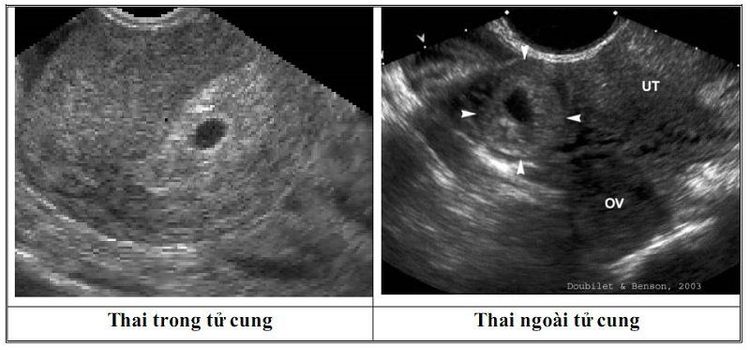
Thai ngoài tử cung chẩn đoán qua siêu âm
At Vinmec International General Hospital, there is a package maternity service as a solution to help pregnant women feel secure because of the companionship of the medical team throughout the pregnancy. When choosing Maternity Package, pregnant women can:
The pregnancy process is monitored by a team of qualified doctors Regular check-up, early detection of abnormalities Maternity package helps to facilitate the process. Birth program Newborns receive comprehensive care To register for examination and treatment at Vinmec International General Hospital, you can contact Vinmec Health System nationwide, or register online HERE HERE
SEE MORE
Symptoms of ruptured ectopic pregnancy How many weeks does it take to break an ectopic pregnancy? Can an ectopic pregnancy have a baby?





